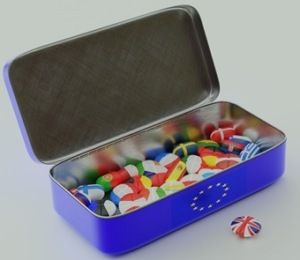Opinion
The Valley of Life: Britain is still key!
Søren Bregenholt
This article is more than 6 years old.

Theresa’s Box: once opened … (photo: Pixabay)
Winston Churchill described Russian foreign policy in 1939 as “a riddle, wrapped in a mystery, inside an enigma”. From an outsider´s perspective today, the UK’s EU policy might fit that description quite well.
Bridging troubled waters
As a life science executive, I sincerely hope and believe British decision-makers will do their utmost to avoid a Hard Brexit.
A Hard Brexit would no doubt have significant ramifications for the British life science industry – and potentially for patients. But regardless of the final Brexit outcome, the British will remain key to European life science, and we at Medicon Valley should not abandon them.
Danish and Swedish life science exports to Britain were worth 3.915 and 2.113 billion kroner in 2017, making it their sixth and eighth biggest markets respectively, and even in the event of a Hard Brexit, it is unlikely it will fall out of the top ten.
Strong Oxbridge standing
Regardless of the outcome, Britain will still be home to one of the world´s most innovative, academically excellent life science clusters.
As documented in the ‘State of Medicon Valley Analysis 2018’, the London-Cambridge -Oxford region is way ahead of every other European life science cluster when it comes to its quality and quantity of academic life science publications – a commonly used indicator of excellence.
As a somewhat smaller, more modestly ranked, albeit more specialised life science cluster, the Medicon Valley Region and its companies and universities will continue to have a lot to gain from life science cross-pollination with Britain.
The Novo Nordisk Research Centre Oxford – which taps into the academic excellence of University of Oxford and the Oxford life science cluster to discover innovative medicines to treat diabetes, obesity and related metabolic diseases – is a very tangible example of this mindset.
It also testifies to the mutual interest involved and the quality of Novo Nordisk R&D, since Oxford University selects its partners very carefully.
No bridge too far
Back in 1939 Churchill concluded that despite the lack of clarity related to Russian actions, the key to understanding them could be found in Russian ‘national interest’.
If, despite the current political uncertainty, we can assume that the same principle of ‘national interest’ will be guiding British long-term relations with the EU, life science in Medicon Valley and Britain will stay connected.
Growth, jobs and innovation will accordingly continue to flow from this relationship for the future benefit of the Medicon Valley Region, the UK and the rest of Europe.

About
Søren Bregenholt
As the chairman of the Medicon Valley Alliance – the gold-labelled Danish-Swedish life science cluster organisation – Søren will address current trends and challenges in the sector.










































